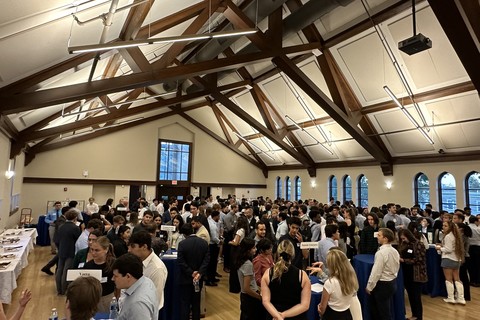Learn more about finding jobs and fellowships.
Looking for a job, fellowship, or year of service? Use this checklist to guide you through the process and check the Career Center calendar for plenty of opportunities to connect with employers and alumni.
Read our Recruitment Policies for Students for the Tufts Career Center no-show policy regarding interviews, info about reneging on jobs, insurance coverage for internships, COVID disclaimers, and more.
Remember: You’re welcome (and encouraged!) to chat with a career advisor as you complete any/all of these steps.
-
Engage in self-assessmentHow do your interests, skills, values, personality, and career competencies relate to potential career paths? Use the tools and worksheets on our Skills and Interests and Competencies and Career Readiness pages to help you think about which sorts of experiences you’re looking for in your first job after Tufts.
-
Establish a timeline and specific goals for your search
How much time will you be able to devote to your job search? Schedule it into your week, much as you would any class, club or other obligation. Set aside time for each of the steps listed here, i.e., learning about careers, preparing a resume and cover letters, searching for and evaluating positions, tailoring documents, applying, and following up.
Set SMART (specific, measurable, achievable, relevant, and time-bound) goals for yourself, e.g., “This week, I’ll visit the Career Center’s drop-in hours for a resume review and review at least 5 job listings on two different search sites.”
As you plan, remember that different career fields have different recruiting timelines! Your process may not look like someone else’s, and that’s to be expected.
-
Learn about career paths and employers
There are numerous ways to research careers and employers, and we encourage you to begin with our Explore Careers and Majors section. Tools like “What Can I Do With This Major?” can give you a big-picture sense of career fields that might fit with your competencies and experiences, while resources like Careers A-Z can help you drill down into particular career paths, potential employers and individual jobs of interest. Another great way to conduct research is to look at where Tufts grads work and attend graduate school via our Destination Outcomes page.
Networking (a.k.a. connecting with people to exchange information and develop contacts) is one of the most effective ways to learn about careers and employers. Best of all, you can learn from anyone: classmates, professors, past internship supervisors, family members, friends, and Tufts alumni.
One way to connect with people is to create a LinkedIn profile and reach out to alumni in The Herd and the Tufts University Career Network (Tufts’ largest LinkedIn group!) for advice in the form of an informational interview — a conversation with someone who can give you insider info about a profession, employer or industry. Another neat resource? Use the LinkedIn Alumni Tool to see where Tufts grads are working, what they studied, where they’re located, and more!
-
Refine your application materialsWhether you’re new to resume and cover letter writing or have revised your documents many times, we can help! Visit our Resume and Cover Letter pages for content tips, formatting best practices, sample documents, and more. Remember: Career Advisors and Career Fellows are available every day for resume and cover letter reviews.
-
Search for jobs and determine how well they match with your criteriaIn addition to your networking efforts, you can find many jobs online through Handshake (the Tufts database for jobs, internships and the campus recruiting program). Also, see our Job Listings page for resources just for Tufts students, job search engines, and region-specific websites. We’ve also included resources related to job searching during COVID-19. Be sure to check out the other subpages in the Find a Job section for information about Campus Recruiting, Career Fairs, International Jobs, Rotational Programs, Fellowships and Gap Year Programs, Tips for International Students and advice for Evaluating and Negotiating Offers.
-
Tailor your documents and apply to positionsBefore you apply, you’ll need to customize your application, i.e., make it clear to the employer that your resume and cover letter are meant for their organization and position. This means demonstrating that you possess the requisite qualifications in the job description, as well as showing that you’ve researched the employer and can convey reasons why you’re interested in what they do. Use this cover letter worksheet for assistance with matching skills/experiences to an employer’s needs.
-
Follow up on applications and plan next stepsFollow up with employers about a week or so after applying (unless they specifically prohibit follow-up). You’re welcome to ask about the status of your application, get info about the hiring timeline (unless those details are already online), or offer additional materials. Brush up on your interviewing skills in preparation for conversations with employers. In thinking about next steps after Tufts, we recommend checking out Real World Ready, a series of online courses covering everything from personal finance and job offer negotiation to employer benefits, apartment leases, and more. To create a Real World Ready account, log into Handshake and view Resources in the Career Center drop-down menu.












